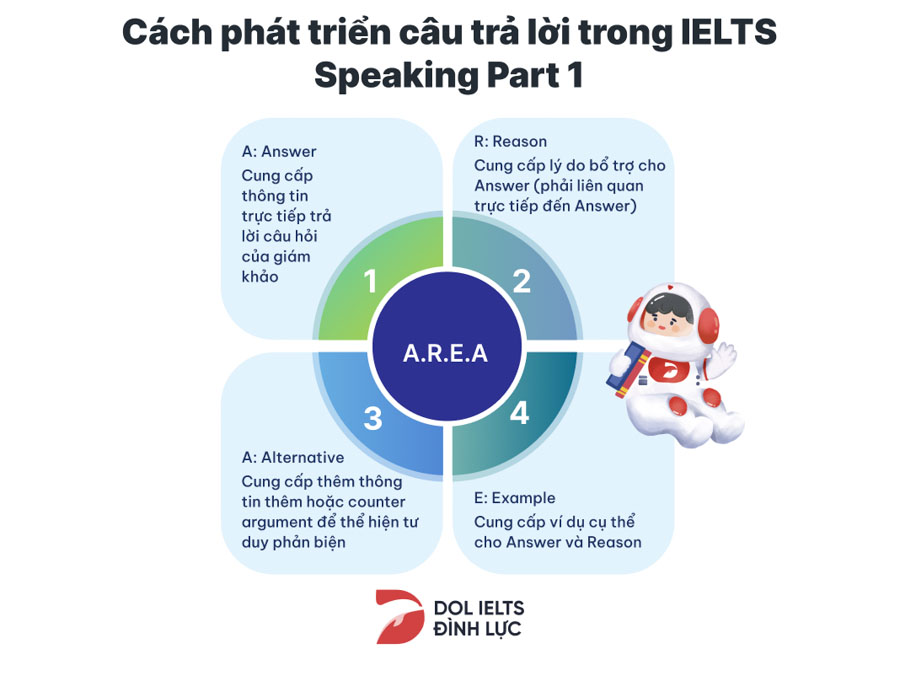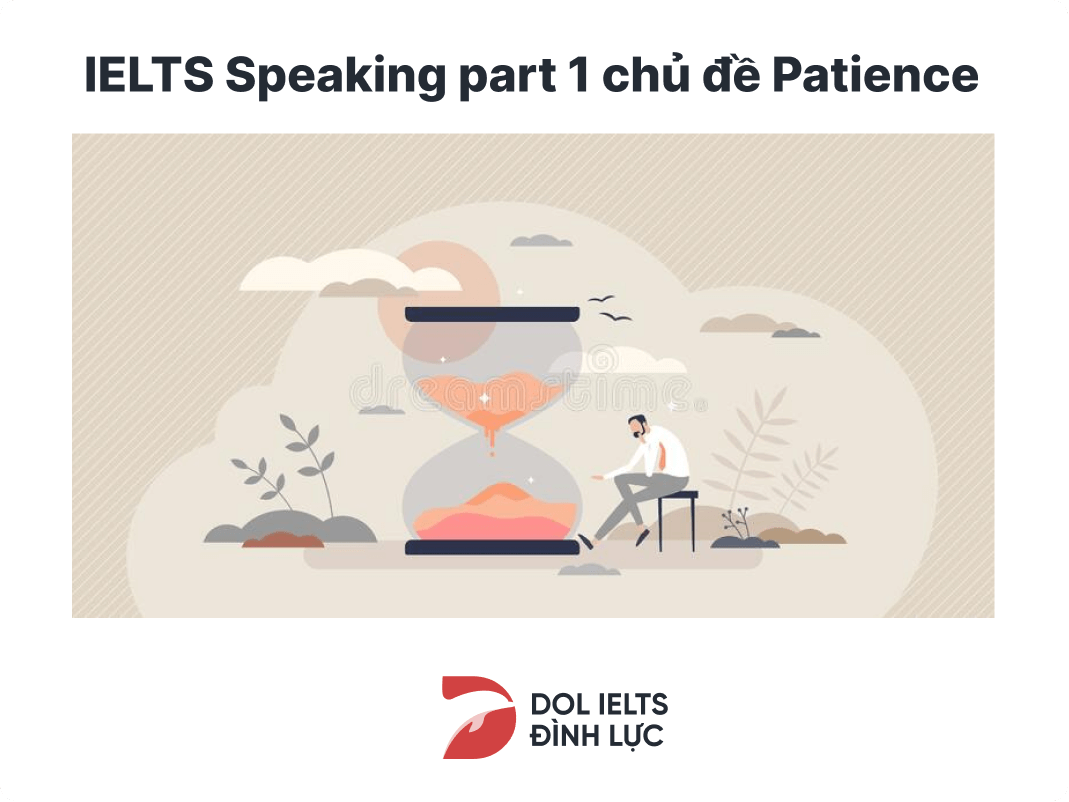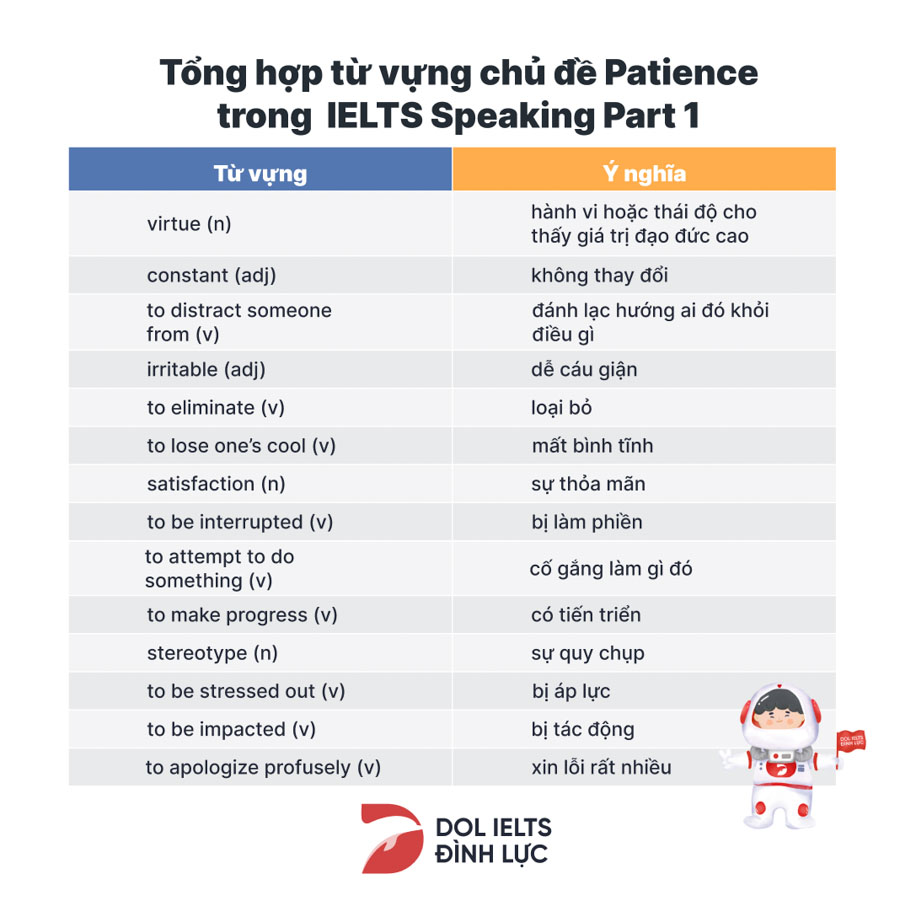IELTS Speaking Patience: Từ vựng và bài mẫu topic Patience
Chủ đề về “tính cách” nói chung, hay “sự kiên nhẫn” nói riêng thường được ra trong phần thi IELTS Speaking Part 1. Đây là một chủ đề không thực sự thách thức, tuy nhiên, rất nhiều thí sinh vẫn gặp khó khăn với chủ đề Patience IELTS Speaking trong phòng thi, đơn giản vì vốn từ vựng hạn chế, và chưa nắm được những cách thức và kĩ thuật để phát triển câu trả lời trong phòng thi.
DOL IELTS Đình Lực
Jan 02, 2023
2 mins read

Table of content
1. What do you think “patience” is?
2. Are you a patient person?
3. Do you think you are more patient now than when you were younger?
4. Do you think you will be more patient in the future?
5. Are you patient in your work or study?
6. When are you impatient?
7. Can you explain why some people are not very impatient?
8. Who is more patient, men or women?
9. How do you feel when people are not patient?
10. Can you give any examples of work that require patience?

1. What do you think “patience” is?
Patience, in my opinion, is a virtue. Unfortunately, most individuals nowadays are quite impatient. Many people, for example, desire to get rich rapidly yet are unwilling to get their hands filthy. As a result, they are continuously complaining about life.
2. Are you a patient person?
It depends on the scenario, but in general, I'm a really patient person. My goals are extremely constant with me. Furthermore, I don't see the sense in getting worked up about things over which I have no control because anger might distract me from objective and rational thinking in difficult situations.
3. Do you think you are more patient now than when you were younger?
Absolutely! I was always irritable, especially when puberty struck and under a lot of pressure from my parents and friends. But now, even though I have a lot more things going through my brain, I've learned to keep track of my thoughts by writing down everything I have to do to discover what makes me antsy. This will allow me to calm down and focus on one activity at a time, as well as eliminate the things that stress me out.
4. Do you think you will be more patient in the future?
I've probably learned to be patient with other people, and I aim to be more patient with myself as well. I need to take a break from pushing myself too hard. The older I become, the more I realize that every good accomplishment takes time.
5. Are you patient in your work or study?
Previously, I couldn't sit at my computer for an hour straight studying, but today I can spend several hours preparing a presentation or report for an impending business meeting. The deadline is one thing, but I believe that our ability to concentrate also improves with age.
6. When are you impatient?

If someone takes their time doing something, I may become upset. Worse, I may easily lose my cool when I've been waiting for someone for a long time and then getting stood up.
7. Can you explain why some people are not very impatient?
Well, I believe this is because they all want quick satisfaction and items without having to wait. Furthermore, most people have several tasks in their heads and hop from idea to thought without taking the time to complete one work first. We live interrupted lives while attempting to multitask, and it is discouraging when we feel we are not making progress.
8. Who is more patient, men or women?
I don't want to seem stereotyped, but I feel that depending on the scenario, both genders might be more patient or impatient. We all have a propensity to push our patience as far as we can, but when we reach the point when we can no longer manage it, we lose control.
9. How do you feel when people are not patient?
Well, I don't mind since I don't want to be stressed out by unpleasant or unimportant things in my life. I won't be impacted at all as long as I'm not the reason or the source of their frustration. However, I am quite sensitive and apologize profusely if I cause somebody annoyance by being late for a meetup.
10. Can you give any examples of work that require patience?
Anyone who wants to excel in work must be patient. However, I feel that some vocations, such as educating autistic children or dealing with customer complaints all day, need a great amount of patience.
Bạn có thể sử dụng thì hiện tại hoàn thành không? Còn thì hiện tại hoàn thành tiếp diễn thì sao? Sử dụng các thì và cấu trúc câu phức tạp hơn sẽ cải thiện điểm phần thi IELTS Speaking của bạn đấy
https://cisl.edu/ielts-part-1-speaking-practice/
Từ vựng:
Virtue (adj): đức hạnh
Constant with: đồng nhất
Distract somebody from something: làm ai xao nhãng
Be under a lot of pressure: dưới nhiều áp lực
Eliminate (v): loại bỏ
Lose one's cool: mất bình tĩnh
Stand up: cho ai leo cây
Satisfaction (n): sự thỏa mãn
Interrupted (adj): bị gián đoạn
Attempt+ to (v): cố gắng để
Multitask (v): làm nhiều việc cùng lúc
Make progress: có tiến triển
Stereotyped (adj): rập khuôn
Propensity to: xu hướng
Impacted (adj): bị ảnh hưởng
Excel in (v): vượt trội
Stressed out (adj): căng thẳng
Frustration (n): sự thất vọng
Apologetic (adj): xin lỗi
Profusely (adv): nhiều

📖 DOL xin gửi bạn một vài chủ đề tham khảo khác:
IELTS part 1 Study
11. Các câu hỏi thường gặp:
Từ đồng nghĩa của patience là gì?
Composure, diligence, endurance, fortitude, grit, humility, moderation, perseverance, persistence, poise, restraint, self-control, tolerance, backbone, bearing, calmness, constancy, cool, equanimity, forbearance.
Gợi ý trả lời câu hỏi: How is patience a strength?
Có thể trả lời như sau: Patience is the strength of will to navigate the obstacles and challenges you will face as you work the process. Patience is essential because there will be problems. There will be people who irritate you and situations that frustrate you. If you are patient, you stay focused on doing the work.
Gợi ý trả lời câu hỏi: How can I improve my patience?
Gợi ý trả lời:
Practice accepting your current circumstances
Actively build a tolerance for being a bit uncomfortable
When you’re feeling rushed, consciously slow down
Practice being a good listener
Gợi ý trả lời câu hỏi: Why is patience important in communication?
Thí sinh có thể trả lời như sau: Someone who has patience in the workplace has both the ability to listen and the ability to deliver the message directly to the intended recipient in a way they fully understand and connect with. These two skills are very closely linked.
Như vậy là DOL đã cung cấp cho các bạn 10 câu hỏi, câu trả lời và phần từ vựng tham khảo cho chủ đề Patience IELTS speaking. Mong là các bạn có thể học được nhiều từ vựng theo chủ đề hay và những cách diễn đạt câu trả lời hiệu quả cho topic này.
Nếu các bạn có câu hỏi nào, hay thắc mắc làm thế nào để cải thiện trình độ tiếng Anh của bản thân trong thời gian ngắn nhất, hãy liên hệ DOL để được tư vấn nhé. Tất cả chương trình học ở DOL English được thiết kế giúp người học rút ngắn thời gian học tập nhất có thể mà vẫn được mục tiêu band điểm IELTS mơ ước mà bạn cần để thực hiện mục tiêu bản thân trong tương lai.
Table of content
1. What do you think “patience” is?
2. Are you a patient person?
3. Do you think you are more patient now than when you were younger?
4. Do you think you will be more patient in the future?
5. Are you patient in your work or study?
6. When are you impatient?
7. Can you explain why some people are not very impatient?
8. Who is more patient, men or women?
9. How do you feel when people are not patient?
10. Can you give any examples of work that require patience?

